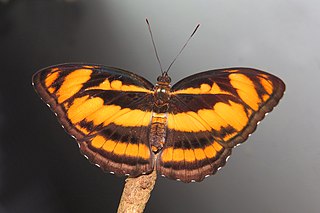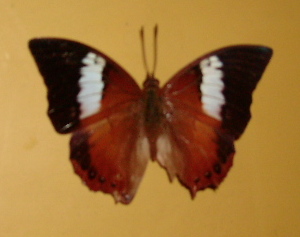
Papilio paris, the Paris peacock swallowtail, is a species of swallowtail butterfly found in the Indian subcontinent and southeast Asia.

Papilio krishna, the Krishna peacock, is a large swallowtail butterfly found in forests in China, Nepal, north east India, Myanmar and Vietnam.

Colotis danae, the crimson tip or scarlet tip, is a small butterfly of the family Pieridae, that is, the yellows and whites. It is found in Asia and Africa.

Charaxes marmax, the yellow rajah, is a butterfly found in India that belongs to the rajahs and nawabs group, that is, the Charaxinae group of the brush-footed butterflies family.

Hypolimnas misippus, the Danaid eggfly, mimic, or diadem, is a widespread species of nymphalid butterfly. It is well known for polymorphism and mimicry. Males are blackish with distinctive white spots that are fringed in blue. Females are in multiple forms that include male-like forms while others closely resemble the toxic butterflies Danaus chrysippus and Danaus plexippus.

Athyma nefte, the colour sergeant, is a species of brush-footed butterfly found in tropical South and Southeast Asia.

Cethosia nietneri, the Tamil lacewing, is a species of nymphalid butterfly found in Sri Lanka and south India. The species name is after John Nietner who obtained specimens of the butterfly from Ceylon from which it was described.

Catochrysops strabo, the forget-me-not, is a small butterfly found in Asia that belongs to the lycaenids or blues family. The species was first described by Johan Christian Fabricius in 1793. It is found in Sri Lanka, India, from Sikkim to Indochina and in Sundaland, Sulawesi and the Philippines.

Charaxes andara is a butterfly in the family Nymphalidae. It is found in eastern and southern Madagascar, where it is found in Afrotropical forests. It is very similar to Charaxes brutus, of which it has been considered a subspecies.

Charaxes etheocles, the demon charaxes, is a butterfly in the family Nymphalidae. It is found in Senegal, Guinea, Sierra Leone, Liberia, Ivory Coast, Ghana, Togo, Nigeria, Cameroon, Gabon, the Central African Republic, the Republic of the Congo, Angola, the Democratic Republic of the Congo, Sudan, Ethiopia, Uganda, Kenya, Tanzania and Zambia.

Charaxes doubledayi, Doubleday's untailed charaxes, is a butterfly in the family Nymphalidae. It is found in Sierra Leone, Ivory Coast, Ghana, Togo, Nigeria, Cameroon, Bioko, the Republic of the Congo, the Central African Republic, the Democratic Republic of the Congo and western Tanzania. The habitat consists of lowland tropical evergreen forests. It is a very rare butterfly

Charaxes latona, the orange emperor, is a butterfly of the rajahs and nawabs group, i.e. the Charaxinae group of the brush-footed butterflies family. It is native to the tropical rainforests of eastern Indonesia, western Melanesia and far northern Queensland, Australia, where it is limited to the Iron Range.

Charaxes mars, the iron rajah, is a butterfly of the rajahs and nawabs group, i.e. the Charaxinae group of the brush-footed butterflies family. It is endemic to Sulawesi in central Indonesia. Charaxes mars is a large butterfly with forewings with concave outer edge and hindwings each with a tail. The upper side of the forewings is dark blue and light in the basal part. The hindwings are orange with a submarginal line of dark brown ocelli.

Charaxes distanti is a butterfly in the family Nymphalidae. It was described by Eduard Honrath in 1885. It is found in the Indomalayan realm.

Charaxes borneensis, the White Banded Rajah, is a butterfly in the family Nymphalidae. It was described by Arthur Gardiner Butler in 1869. It is found in the Indomalayan realm.

Charaxes nitebis, the green rajah, is a butterfly in the family Nymphalidae. It was described by William Chapman Hewitson in 1859. It is found in the Indomalayan realm.

Charaxes affinis is a butterfly in the family Nymphalidae. It was described by Arthur Gardiner Butler in 1866. It is found in the Indomalayan realm.

Charaxes antonius is a butterfly in the family Nymphalidae. It was described by Georg Semper in 1878. It is endemic to Mindanao (Philippines) in the Indomalayan realm.

Charaxes bupalus is a butterfly in the family Nymphalidae. It was described by Otto Staudinger in 1889. It is endemic to Palawan in the Indomalayan realm.

Charaxes ocellatus is a butterfly belonging to the family Nymphalidae. It was first described by Hans Fruhstorfer in 1896. This species is endemic to the Lesser Sunda Islands in the Australasian realm, near the Wallace line.



















